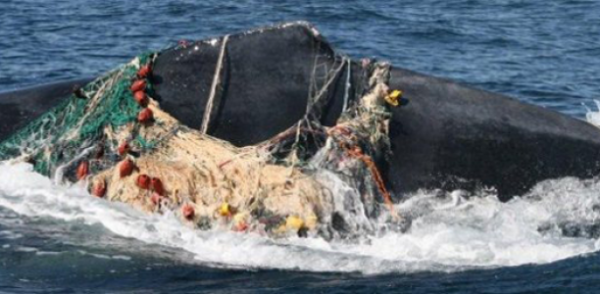Entanglement Response Experts Meet in Provincetown, USA
The IWC is holding its fourth workshop on large whale entanglement in June. Experts from around the world will gather at the Center for Coastal Studies, Provincetown, to tackle a full agenda which includes a review of entanglement response capacity building, long-term entanglement mitigation, and safety of response teams.
Entanglement in fishing gear is estimated to kill over 300,000 whales and dolphins every year. As well as the conservation impacts which affect some of the most critically endangered cetacean populations, entanglement is a serious welfare issue. It can cause animals to drown or starve as well as sustain painful, long-term injuries.
The IWC launched the Global Whale Entanglement Response Network in 2011. The immediate aim of the programme was to build safe and effective entanglement response capability around the world. The long-term goal is to prevent entanglements from happening in the first place.
The first entanglement response training workshop was held in 2012. Since then, the programme has trained participants on five continents, reaching over 1000 scientists, conservationists and government representatives from nearly 30 countries. This month’s meeting will hear from some of the national teams recently joining the IWC’s global network, from Chile to Norway, and Peru to Russia.
The Provincetown meeting will also review progress against the overall aim of preventing entanglements from happening. An important strand of this work is improved data gathering. Only by building a clearer picture of fishing gear type, configuration and origin, can experts devise and target the most effective mitigations. As well as training responders to collect the necessary information from each entanglement, the IWC is developing an Entanglement Database. This valuable tool will store, sort and support analysis of entanglements around the world, and the information obtained will be shared with other organisations working on this issue.
Another important item on the agenda of the June meeting is safety. Tragically a Canadian responder was killed last year, whilst trying to help an entangled whale. Entanglement response is a dangerous activity, involving small boats on open water, and large wild animals, often injured and distressed. Exploring new ways to minimise risk as far as possible has been a key objective from the beginning of the IWC’s entanglement response programme. The meeting will consider whether there are any new developments that might help further reduce the risk to responders, for example new safety protocols, development of more remote-use tools or attempting to sedate animals before disentanglement is attempted.
The Global Whale Entanglement Response Network is a partnership between the IWC and the Centre for Coastal Studies, Provincetown (CCS). CCS are kindly hosting the meeting which takes place 5-7 June.
To read more about the IWC Global Whale Entanglement Response Initiative click here.

